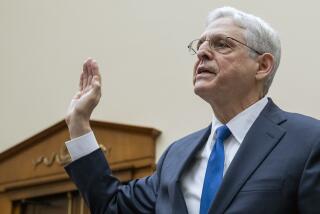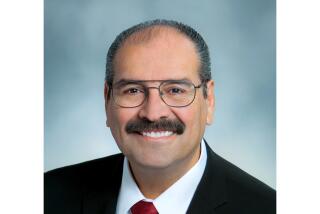Gonzales Also Ends Up Defending His Credibility
- Share via
WASHINGTON — A year ago, even Democrats in Congress viewed newly minted Atty. Gen. Alberto R. Gonzales as a breath of fresh air. After years of battling his hard-edged predecessor, John Ashcroft, the quiet, self-effacing former judge was seen as marking a new era of open and harmonious relations.
Gonzales’ appearance Monday before the Senate Judiciary Committee showed what a difference a year can make.
Testifying about the domestic spying program that President Bush secretly approved after the Sept. 11 terrorist attacks, Gonzales found himself defending not only the legal rationale of the program but also his own credibility.
Before Gonzales could utter a word of his opening statement, members of the panel wrangled over whether he should have to swear to tell the truth to the committee. Democrats were armed with a DVD that they said featured misleading statements by Gonzales and Bush about the program before its existence was disclosed in December by the New York Times.
“This is really not a very good way to begin this hearing,” said the Judiciary Committee chairman, Sen. Arlen Specter (R-Pa.).
The panel voted along party lines to give Gonzales a pass on the oath, even though he said he would take one.
The Democrats were forced to show their video to reporters outside the hearing room after Specter ruled that reading a transcript of the tape was adequate.
Still, Gonzales found himself repeatedly on the defensive, having to justify what Democrats alleged were evasions.
Sen. Russell D. Feingold (D-Wis.) accused him of giving a misleading answer to a question about the scope of presidential power -- the linchpin of the debate over the eavesdropping program -- during his confirmation hearing last January.
At the time, Feingold asked Gonzales a question that seemed to touch on the then-secret program -- whether he believed that Bush had the power to authorize warrantless wiretaps of Americans “in violation of the criminal and foreign intelligence surveillance statutes of this country.”
Gonzales responded that the question was hypothetical, but added that it was “not the policy or the agenda of this president to authorize actions that would be in contravention of our criminal statutes.”
On Monday, Feingold said that answer was misleading. Gonzales said the earlier response was accurate because the administration had always believed that the eavesdropping program was legal and authorized by Congress.
“Senator, I’ve told the truth then; I’m telling the truth now,” Gonzales said.
“Mr. Chairman, I think the witness has taken mincing words to a new high,” Feingold said.
Sen. Richard J. Durbin (D-Ill.) cited another exchange during the confirmation hearing, when Gonzales declared that Bush had never exercised his authority to conclude that a law was unconstitutional and refused to comply with it.
Durbin said Monday that the administration was doing just that in the domestic spying program, and was skirting a 1978 law -- the Foreign Intelligence Surveillance Act -- that established procedures for a court to consider the sorts of domestic eavesdropping that the administration undertook.
“So how can your response be valid today in light of what we now know?” Durbin asked.
“Oh, it’s absolutely valid, senator,” Gonzales replied.
Gonzales said the administration believed a joint congressional resolution after the Sept. 11 attacks effectively supplemented the Foreign Intelligence Surveillance Act by giving Bush the power to take all necessary action to protect the country -- implicitly including electronic surveillance without warrants.
The credibility attacks left Gonzales acting as defender-in-chief for the president.
Sen. Dianne Feinstein (D-Calif.) said Bush had misled the public during a 2004 speech in Buffalo, N.Y., in which he sought to ease fears about the Patriot Act by stressing the role that courts played in authorizing wiretaps.
“ ‘Any time you hear the United States government talking about wiretap, it requires -- a wiretap requires a court order,’ ” Feinstein quoted Bush as saying. “ ‘Nothing has changed, by the way. When we’re talking about chasing down terrorists, we’re talking about getting a court order before we do so.’ ”
“Mr. Attorney General, in light of what you and the president have said in the past month, this statement appears to be false,” Feinstein said. “Do you agree?”
Gonzales said the statement was taken out of context, and that Bush was addressing a particular kind of wiretap.
“I take great issue with your suggestion that somehow the president of the United States was not being totally forthcoming with the American people,” he responded.
Feinstein asked Gonzales whether the administration believed that the post-Sept. 11 congressional resolution was so all-encompassing that it gave officials the authority to give “false or misleading answers” if the president thought the truth might hinder his ability to function as commander in chief.
“Absolutely not, senator,” Gonzales replied. “Of course not.”
The parrying goes to a major concern about Gonzales, who has been part of the Bush inner circle since Bush’s days as governor of Texas.
His defenders say he is conscientiously doing all he can to protect the country from attack. Gonzales stressed during his confirmation hearing last year that he recognized he would have a broader constituency as attorney general, compared to his job as White House counsel, serving the nation rather than just Bush.
“Atty. Gen. Gonzales is candid and honest when giving legal advice -- as every good and capable lawyer should be with their client,” said Justice Department spokeswoman Tasia Scolinos. “If anything, the level of trust and respect that comes from years of working together allows him to be exceptionally forthcoming when giving advice.”
Critics still perceive him as insufficiently independent of his old boss.
“It is sort of startling. Here is a very mild-mannered guy, a very nice person, who has, on virtually every issue in the war on terror, told the president what he wants to hear,” said David Cole, a law professor at Georgetown University. “The constant theme is that the president, as commander in chief, is essentially above the law.”
More to Read
Get the L.A. Times Politics newsletter
Deeply reported insights into legislation, politics and policy from Sacramento, Washington and beyond. In your inbox twice per week.
You may occasionally receive promotional content from the Los Angeles Times.










